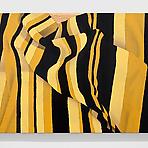Andrea Zittel
A-Z Uniforms 1991-2002
January 22 – February 21, 2004
Gallery 2
A Brief History of A-Z Uniforms Andrea Zittel
A-Z Six Month Uniforms
Most of us own a favorite garment that always makes us look and feel good, but social etiquette dictates that we wear a different change of clothes every day. Sometimes this multitude of options can actually feel more restrictive than a self-imposed constant. Because I was tired of the tyranny of constant variety, I began a six-month uniform project. Starting in 1991 I would design and make one perfect dress for each season, and would then wear that dress every day for six months. Although utilitarian in principle, I often found that there was a strong element of fantasy or emotional need invested in each season's design. The experiment as a whole worked quite well, especially since dreaming up the next season's design helped relieve any monotony that might have occurred from wearing the same dress every day.
A-Z Personal Panel Uniforms
After four years of making uniforms, I began to find it more and more difficult to come up with a new style of dress each season, so I decided to create some guidelines to make the decision a little easier. I looked around at the numerous rules that had already been made by other designers, particularly by the Russian Constructivists. Their idiom that "geometric patterns maintained the integrity of the fabric" (which was woven in rectangles) was arbitrary in one way, lucid and sensible in another. As a way to push this rule to its absurd yet logical conclusion, I decided to take the position that all dresses should only be made from rectangles…almost as if the fabric had been sliced from the bolt. The most interesting thing about the rectangular format is that the creative variations within it become almost limitless, and it was possible to achieve the effect of either a prom dress or a blacksmith's apron with a few suggestive details.
RAUGH Uniforms
When I was developing my new ideology called RAUGH, I realized that I could evolve the Personal Panels to their most logical extreme by using only rectangles of fabric literally torn from the bolt. This reduced my activity in making a dress to a few minute modifications, such as using safety pins to fasten a strap to fabric or a single strategic seam. While the RAUGH garments require no expertise in either conception or construction, it took skill to make designs that looked both sophisticated and attractive.
Single Strand Uniforms
One idiom behind the A-Z Personal Panels is that they are a first hand evolution of their former material. Eventually, I realized that this dictate could be even more directly achieved by making clothing out of a single strand, instead of woven fibers. The resulting "Single Strand Garments" were crocheted one per quarterly season. I liked crochet because it required the least number of implements possible in the construction of the garment-a single crochet hook. (I would break the yarn rather than cutting it with scissors) It was also perfect because it meant that I could create a dress anywhere, anytime. With my hectic schedule, much of my otherwise wasted time spent on planes and traveling could be made both creative and productive.
Hand Made Single Strand Uniforms
It might sound silly, but one of my biggest fears when I was in the process of crocheting a dress was that I would loose my hook. If that happened, I would have to recalculate the gauge of my pattern to a different sized hook and start over again. Considering that each dress takes six to eight weeks of labor that could be a real setback. I began to wonder if there was a way to link yarn directly off of my fingers without using any extraneous tools (other than my own body). I liked the purity of this idea, as it reminded me of an insect spinning its own cocoon, but instead I would be using my body to weave a covering for itself. In the fall of 2001 I finally figured out a way to do this. The technique was simple, but it just required practice and precision to control the tension correctly. As I gained skill, I started to make the patterns less linear and more abstract so that they resembled webs or uneven netting.
Fiber Form Uniforms
Since 1991 the technical and conceptual evolution in the A-Z Uniforms Series has been gravitating towards an increasingly direct way of making something. After I had finally reduced the tools of production to simply using my own hands, I then began to consider the material that I was using. What if I could trace the strand of yarn back to its original form as fiber? Now I am finally beginning to make the most direct form of clothing possible by hand "felting" wool directly into the shape of a garment, and thereby inventing my own ways to make shirts and dresses. Because the clothing is made as one piece, there are no seams involved, and when it is finished I use a safety pin to connect the two sides so that it will stay on! I have encapsulated this body of work under the heading "A-Z Advanced Technologies," which plays off of the way that something can be both incredibly primitive and quite sophisticated at the same time. In other areas of A-Z Advanced Technologies I am also beginning to develop new materials and fabrication strategies for making furniture and objects that I use in the practice of my own day to day living.

